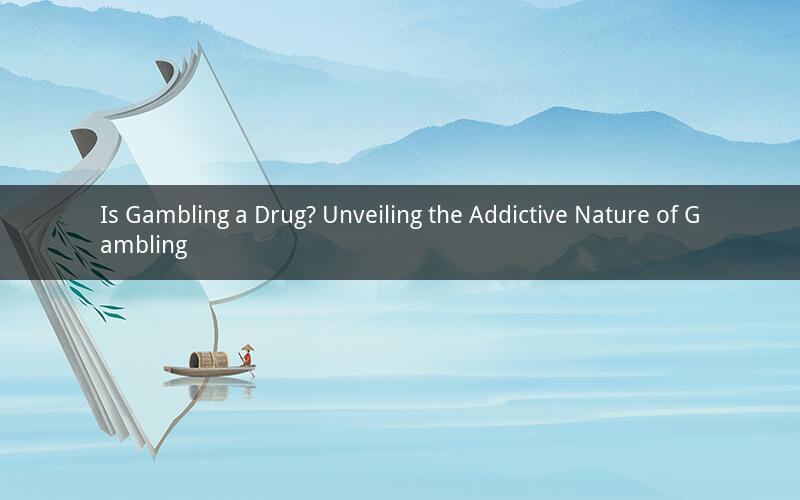
Introduction:
Gambling has been a popular form of entertainment for centuries, captivating individuals from all walks of life. However, the question of whether gambling can be classified as a drug has sparked intense debate among experts and enthusiasts alike. This article delves into the addictive nature of gambling, exploring its similarities to drug addiction and the potential consequences it can have on individuals and society.
1. Understanding the Addictive Nature of Gambling:
Similar to drug addiction, gambling addiction involves a cycle of obsession, tolerance, and withdrawal. Individuals who engage in excessive gambling often experience intense cravings, despite the negative consequences it may bring. The release of dopamine in the brain, triggered by the anticipation of winning, creates a sense of euphoria and reinforces the desire to continue gambling.
1.1 The Dopamine Connection:
Dopamine is a neurotransmitter responsible for the brain's reward system. When individuals win at gambling, their brain releases dopamine, leading to feelings of pleasure and satisfaction. Over time, this constant release of dopamine can lead to a tolerance, where individuals need to gamble more frequently and with higher stakes to achieve the same level of pleasure.
1.2 The Cycle of Addiction:
The cycle of gambling addiction often begins with a desire to experience the thrill and excitement of winning. However, as individuals continue to gamble, the need for more intense experiences grows. This can lead to increased risk-taking behavior, financial difficulties, and strained relationships. Eventually, the individual may find themselves trapped in a cycle of obsession, where gambling becomes the sole focus of their life.
2. Psychological and Emotional Consequences:
Gambling addiction can have severe psychological and emotional consequences, similar to drug addiction. Individuals may experience feelings of guilt, shame, and depression, as they struggle to control their gambling habits. The constant pursuit of winning can also lead to anxiety and stress, further exacerbating mental health issues.
2.1 Psychological Effects:
Gambling addiction can cause significant psychological distress, including mood disorders, personality changes, and cognitive impairments. Individuals may experience heightened irritability, impulsivity, and a lack of focus, which can impact their daily functioning and relationships.
2.2 Emotional Consequences:
The emotional toll of gambling addiction can be immense. Individuals may experience feelings of despair, hopelessness, and isolation, as they struggle to overcome their addiction. The fear of failure and the desire to recoup lost money can lead to irrational behavior and further financial devastation.
3. Social and Economic Impacts:
Gambling addiction not only affects individuals but also has broader social and economic implications. The consequences of excessive gambling can extend to families, communities, and even the economy as a whole.
3.1 Family and Relationships:
Gambling addiction can strain relationships, leading to conflicts, separation, and even divorce. The financial burden of gambling can also cause stress and tension within families, further deteriorating the quality of life.
3.2 Economic Impacts:
Excessive gambling can have significant economic consequences, both for individuals and society. The loss of income, financial debt, and the need for professional help can create a heavy burden on individuals and their families. Additionally, gambling addiction can lead to increased crime rates and social problems within communities.
4. Treatment and Support:
Recognizing the addictive nature of gambling is the first step towards seeking help. Various treatment options and support systems are available to assist individuals in overcoming their gambling addiction.
4.1 Treatment Options:
Treatment for gambling addiction can range from therapy and counseling to residential programs and support groups. Cognitive-behavioral therapy (CBT) is often used to address the underlying psychological factors contributing to gambling addiction. Medications may also be prescribed to help manage symptoms of anxiety and depression.
4.2 Support Systems:
Support groups, such as Gamblers Anonymous, provide a safe and supportive environment for individuals struggling with gambling addiction. These groups offer a sense of community and understanding, helping individuals stay motivated and accountable in their recovery journey.
5. Conclusion:
While gambling may not be classified as a drug in the traditional sense, its addictive nature is undeniable. The release of dopamine, the cycle of addiction, and the psychological, emotional, and social consequences make gambling a substance that can have a profound impact on individuals and society. Recognizing the risks and seeking help are crucial steps towards overcoming gambling addiction and reclaiming a fulfilling life.
Questions and Answers:
1. Q: Can gambling addiction be treated?
A: Yes, gambling addiction can be treated. Various treatment options, including therapy, counseling, residential programs, and support groups, are available to assist individuals in overcoming their addiction.
2. Q: How can I identify if someone has a gambling addiction?
A: Signs of gambling addiction include excessive time spent on gambling activities, neglecting responsibilities, financial difficulties, and experiencing negative consequences as a result of gambling.
3. Q: Can gambling addiction be prevented?
A: While there is no foolproof way to prevent gambling addiction, education and awareness about the risks can help individuals make informed decisions. Setting limits, practicing self-control, and seeking support are also effective preventive measures.
4. Q: Is there a genetic component to gambling addiction?
A: Research suggests that there may be a genetic component to gambling addiction. Individuals with a family history of addiction may be at a higher risk of developing gambling addiction themselves.
5. Q: Can gambling addiction lead to other forms of addiction?
A: Yes, gambling addiction can co-occur with other forms of addiction, such as substance abuse or behavioral addictions. This is often referred to as a dual diagnosis, and individuals may require treatment for multiple addictions simultaneously.